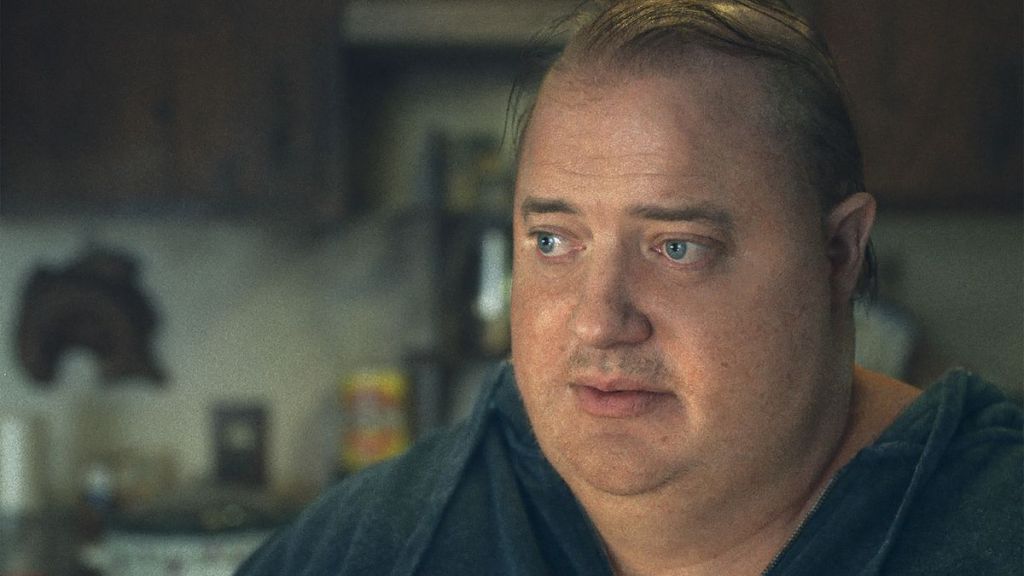Auteur director Darren Aronofsky has never made the same film twice. From the grainy mathematical horror of Pi to the romantic fantasy-drama of The Fountain to the sprawling biblical vistas of Noah, each of his films sharply diverges in style and subject matter from the one before it, pressing forward into strange new genres.
That said, his movies certainly share some common motifs — particularly a piercing sense of longing for transcendence, for the eternal. Every single film he’s ever directed has this quest at its center. Almost as ubiquitous across his work, though, are ferocious depictions of the body in pain, pressed to its limits and beyond in pursuit of the infinite’s perfection. One recalls the heroin-blackened flesh of Requiem for a Dream, the shattered toenails and torn cuticles of Black Swan, and the gruesome tableau unveiled at the climax of mother!
Aronofsky’s latest, The Whale, is no exception to any of this. The film has little stylistic precedent in Aronofsky’s canon: it’s a poignant, stagey character study adapted from a play by Samuel D. Hunter. It’s shot through with meditations on God and salvation. And suffering bodies — well, one in particular — are at its very center.
Charlie (Brendan Fraser, in a bravura career-best performance) is a morbidly obese man who lives alone in small-town Idaho, teaching English classes over Zoom to pay the bills. Estranged from his wife and daughter after leaving his family for a younger man — who ultimately ended up committing suicide — Charlie suffers in the midst of self-destructive isolation, culminating in binge-eating sequences more grotesque than most horror films. His tedium is punctuated only by visits from nurse Liz (Hong Chao) and Thomas, a young evangelical missionary concerned with Charlie’s salvation (Ty Simpkins). But something is missing in such encounters: Liz is primarily interested in saving Charlie’s body, and Thomas in saving his soul — a decidedly unreconciled dyad of immanence and transcendence.
The soul with whom Charlie struggles most to connect is his acerbic daughter Ellie (Sadie Sink, of Stranger Things fame). On the verge of failing out of school, Ellie agrees to spend time with her barely mobile father in return for homework help and a hefty inheritance upon his inevitable death. Through their verbal sparring, the deep pain beneath her cynicism finally becomes clear — and so too does the faintest possibility of real healing.
Much of the film is taken up with stray ruminations about the importance of “authenticity,” a notion conceived rather ambiguously here. It’s implied that Charlie’s boyfriend died because he couldn’t reconcile his faith with his sexual orientation — in other words, because he couldn’t live as he really was — and Charlie repeatedly insists that his online students drop the “bullshit” of high school essay-writing and learn to speak authentically. Whatever The Whale is trying to say here, though, its “authenticity” must go beyond the affirmation of unfettered personal choice. Such unfettered choices, after all, have pushed Charlie to his state of misery. Rather, “authenticity” here seems to be a kind of purgative process, one that discloses the truth that human souls are most truly constituted through their relationships with other people.
Or, put another way, living in truth is the precondition for the recognition of grace. For The Whale is indeed a story of grace — but it is a terrible, raw and painful grace indeed, grace of the sort Flannery O’Connor captured so viscerally. The film’s sense of hope is revealed in the midst of profound grotesquerie, in fleeting glimpses of a purposive meaning beyond the human misery depicted so disturbingly onscreen.
The Whale makes for strange Christmastime viewing. There’s no getting around it: this is a weird, wordy arthouse flick that was likely to be to very few holiday moviegoers’ taste. But as odd and raw as it is, there’s a moral and psychological depth to The Whale that’s hard to find elsewhere. Longtime Aronofsky appreciators will find much to ponder here. They may even detect a strange beauty beneath the grease and grime.

















